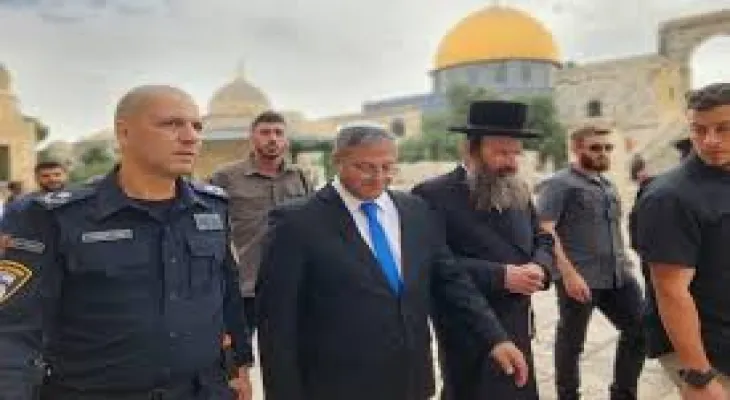Search here
Newspaper
Search here

Arab Canada News
News

Published: July 18, 2024
The far-right Israeli national security minister stormed the most sensitive holy site in Jerusalem today, Thursday, a move that could disrupt sensitive ceasefire talks in Gaza.
Itamar Ben Gvir, a radical settlement leader, stated that he ascended to the contested Al-Aqsa mosque compound atop a hill in Jerusalem to pray for the return of hostages "but without a reckless deal and without surrender."
This move threatens to disrupt sensitive talks aiming for a ceasefire in the ongoing nine-month war between Israel and Hamas. Israeli negotiators arrived in Cairo on Wednesday to continue the discussions.
The incursion also comes just days before Israeli Prime Minister Benjamin Netanyahu departs for a trip to the United States, where he will address Congress.
Ben Gvir stated while standing in front of the golden dome of the Al-Aqsa mosque that he "prays and works hard" to ensure Netanyahu does not succumb to international pressures and continues the military campaign in Gaza.
Ben Gvir last stormed the site in May to protest against unilateral recognition of a Palestinian state by countries.
He has been convicted eight times on charges including racism and supporting a terrorist organization. When he was a teenager, his views were so extreme that the army prevented him from compulsory military service.
As Minister of Security, Ben Gvir oversees the police force in the country. As a key partner in the coalition, he also holds the ability to deprive Netanyahu of his parliamentary majority and attempt to force early elections.
Ben Gvir has used his influence to push favored projects and encourage Netanyahu to proceed with the war in Gaza despite widespread calls for a ceasefire agreement that would bring the hostages home.
The Palestinian Foreign Ministry condemned Ben Gvir's visit, describing it as a "provocative intrusion" that jeopardizes the fragile status quo regarding the compound atop the hill in Jerusalem, which is sacred to both Muslims and Jews.
Jews sanctify the site as the Temple Mount, whereas Muslims sanctify it as the Al-Aqsa Mosque compound, a holy site and important national symbol. Ben Gvir has repeatedly visited the site during times of conflict, provoking condemnation. Tensions over the compound have sparked previous rounds of violence.
In a nighttime session that lasted until Thursday morning, the Israeli parliament overwhelmingly approved a resolution rejecting the establishment of a Palestinian state. The vote was largely symbolic and aimed to send a message ahead of Netanyahu's trip to the United States.
The International Court of Justice at the United Nations is expected to issue an advisory opinion on Friday regarding the legality of Israel's 57-year occupation of Palestinian territories, a legal matter unrelated to the current war between Israel and Hamas.
Israeli airstrikes late Thursday in central Gaza resulted in the deaths of at least 11 people, according to the Hamas-run civil defense organization and hospitals. At least two children and two women were killed in airstrikes on a home and a car.
In recent weeks, Israel has intensified its strikes in central Gaza, where many Palestinians have fled to escape fighting in other parts of the besieged enclave. The Israeli military stated that it targeted a senior commander of the Palestinian Islamic Jihad's naval forces in Gaza City, and another commander in Islamic Jihad responsible for launching rockets in the Shujaiya neighborhood.
Israel also stated that it killed a senior leader affiliated with Hamas and other armed groups in Lebanon. The Sunni Islamic group identified him in a statement as Muhammad Hamid Jabara and said he was killed in an airstrike in the Bekaa Valley region of Lebanon near the Syrian border. The Israeli military described Jabara as a Hamas operative in Lebanon who helped coordinate attacks by the Islamic group targeting northern Israel.
The war in Gaza, which erupted due to Hamas’s attack on southern Israel on October 7, has resulted in the deaths of more than 38,600 people, according to the health ministry in the enclave, which does not distinguish between fighters and civilians in its count. The war has caused a humanitarian disaster in the coastal Palestinian territories, displacing most of its 2.3 million residents and leading to widespread hunger.
Hamas's attack in October resulted in the deaths of 1,200 people, mostly civilians, and militants took around 250 hostages. Approximately 120 of them remain captive, and it is believed that about a third have died, according to Israeli authorities.
Comments